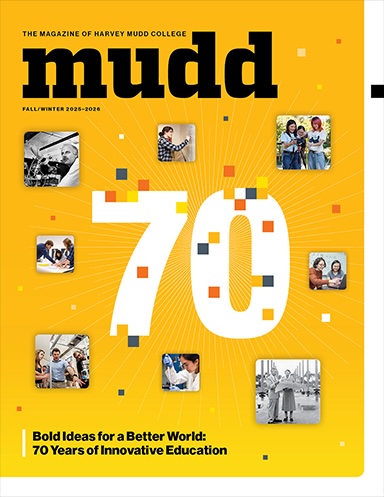Ogba Unlocks NSF LEAPS Grant
October 8, 2025
Maduka Ogba, Harvey Mudd College assistant professor of chemistry, was awarded a LEAPS-MPS grant from the National Science Foundation (NSF). Ogba’s winning proposal, “Unlocking the Potential of Carbones as Metal-Free Catalysts,” is an investigation of the emerging reactivity of carbones, a unique class of two-coordinate zerovalent carbon species, as metal-free catalysts.
LEAPS-MPS (Launching of Early-Career Academic Pathways in the Mathematical and Physical Sciences) supports the launch of the careers of pre-tenure faculty whose research is in MPS fields. A critical goal of the program is to develop a 21st-century STEM workforce representative of society’s full spectrum of talent. The two-year grant will provide Ogba and his team with $223,656 in funding.
In addition to advancing the study of carbon-based organocatalysts, Ogba’s project will provide research training to six students in computational catalysis, cheminformatics, and machine learning.
“My research students are being mentored to become budding experts in several disciplines across chemistry and computer science,” says Ogba. “This focus on a multidisciplinary approach will help build their skill set such that they are highly competitive in the ever-changing STEM landscape.”
The broader impacts of the grant will also bolster Harvey Mudd College’s educational mission by providing 20 first-year HMC students, particularly first-generation students, with the opportunity to engage in STEM research rotations within faculty labs across campus during their first semester. The initiative combines structured experiential learning and enrichment activities to encourage early research involvement among the cohort, enhance their scientific identity and develop resilience in STEM from the beginning of their college journey.
The anticipated project results will inform future studies on the catalytic potential of other zerovalent species. Making the machine learning program publicly accessible encourages collaborative research and significant advancements in catalyst development. “We will be uniquely set up to collaborate with experimental groups wishing to utilize the family of reactive carbon species we are investigating in chemical reactions beyond the scope of the proposal,” says Ogba.
Earlier this year, Ogba and his research students celebrated two published papers and a $70,000 grant from the American Chemical Society Petroleum Research Fund for an interdisciplinary project that combined a similar suite of computational chemistry techniques to address the urgent need for carbon recycling. Ogba credits his students with the success of his lab. “HMC students play a significant role in advancing research in my program,” he says. “Every student in my group has inspired my research efforts.”
